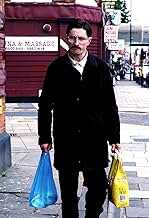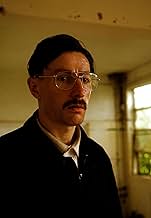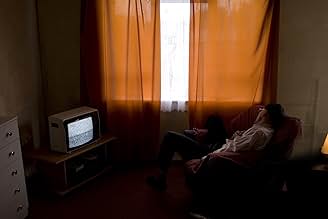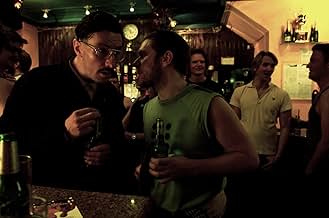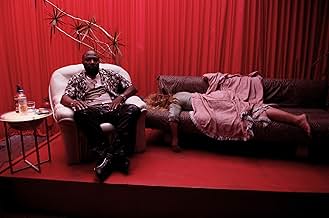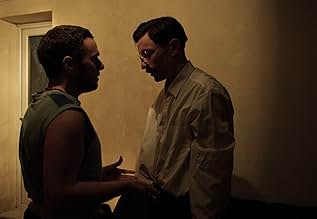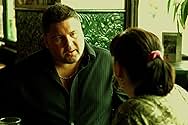IMDb-BEWERTUNG
6,1/10
3778
IHRE BEWERTUNG
Füge eine Handlung in deiner Sprache hinzuA thriller centered on a serial killer in a rundown London suburb.A thriller centered on a serial killer in a rundown London suburb.A thriller centered on a serial killer in a rundown London suburb.
- Auszeichnungen
- 1 wins total
Empfohlene Bewertungen
Tony watches action films on video cassette. He lives alone in a vertical street; a tower block in run down Dalston, a suburb of 'Broken Britain's' North London. Tony has not worked for over thirty years, and has no wish to do so. After all, he does have so much to do at home. This is at least what Tony tells his job centre adviser. This scene happens around the middle of the film, where we have already discovered that Tony has a penchant for murdering people in his flat. In protracted sequences throughout the film, we see Tony rigorously separate the body parts into their smallest components; wrapping them in newspaper and placed in corner-shop blue plastic bags for disposal. Whenever we follow Tony as he walks the streets, he is always carrying blue plastic bags. Tony has a lot of body parts to dump in the Thames.
Gerard Johnson's feature debut is a gritty serial killer movie, - clearly inspired by real-life British serial killer, Dennis Nilson (the Muswell Hill Murderer) - that follows a man completely alienated from his surroundings. He is Nilson in the early 1980's. He only watches action videos from that decade. Like Nilson, Tony (played with all the sweaty awkwardness needed for the character, by Peter Ferdinando) prefers to keep the bodies for company. He talks to them as they are placed on the sofa, or laid out in bed. Tony's life is a cycle of seconds of murder; hours of company; much time dismembering; and a long, perpetual task of bit-by-bit disposal.
Tony picks up men in gay bars. He persuades a couple of smack-heads to go back to his flat. A boy of 10 years goes missing on the estate. A large, stereotypical, aggressive working-class man targets Tony as an obvious target: His appearance could resemble that Daily Mirror image of the bespectacled, moustachiod loner, that so associated with a pederast.
Despite the grim, and inescapable bleakness of the film, director Johnson, finds room to add humour. The film resembles, stylistically, that of John McNaughton's excellently unresolved Henry: Portrait of a Serial Killer (1986). The same concept carries into this film. The life- goes-on attitude. Tony is a ghost in the narrative. Yes, he is the protagonist. But he only exists in his insular world. The space he has dwelt in for "ages". Outside he drifts through the busy streets unnoticed; he fades into obscurity amongst regular people. Anonymously carrying plastic bags of internal organs.
The film is self consciously 1970's in its approach; both stylistically, and thematically. in the latter of those two, '70's horror cinema tended to the ambiguity left by rare conclusions. For the first, this is low budget cinema. However, this is certainly made with style; it is highly competent filmmaking. We know immediately from the start of the film that the filmmakers influences in the golden-years-of-exploitation- cinema are a part of this picture; the typeface of the movie title 'Tony' are reminiscent of the title cards for the American exploitationers this really wants to homage. It is an incredibly well made contribution to the likes of Jeff Gillen and Allan Ormsby's Deranged (1974). However, Tony does not highlight the grotesque, like in much of the films it might be 'riffing' on.
Johnson's film looks like it could possibly fit into the working-class visuals of a kitchen sink drama - only through the eyes of a cold- hearted killer. Although, whilst we are repelled by Tony, do we also feel pathos for a character so out of touch with the world, that he will try and persuade a Chinese man selling DVDs on the street to sell him outmoded video cassettes? Tony is entirely disenfranchised. Because of this separation from reality, Tony is able to pass unseen. Or perhaps, like Mary Harron's American Psycho (2000), this is all imagined. (By the way, I don't believe at all that this was all imagined; that's just how I ended it.)
www.the-wrath-of-blog.blogspot.com
Gerard Johnson's feature debut is a gritty serial killer movie, - clearly inspired by real-life British serial killer, Dennis Nilson (the Muswell Hill Murderer) - that follows a man completely alienated from his surroundings. He is Nilson in the early 1980's. He only watches action videos from that decade. Like Nilson, Tony (played with all the sweaty awkwardness needed for the character, by Peter Ferdinando) prefers to keep the bodies for company. He talks to them as they are placed on the sofa, or laid out in bed. Tony's life is a cycle of seconds of murder; hours of company; much time dismembering; and a long, perpetual task of bit-by-bit disposal.
Tony picks up men in gay bars. He persuades a couple of smack-heads to go back to his flat. A boy of 10 years goes missing on the estate. A large, stereotypical, aggressive working-class man targets Tony as an obvious target: His appearance could resemble that Daily Mirror image of the bespectacled, moustachiod loner, that so associated with a pederast.
Despite the grim, and inescapable bleakness of the film, director Johnson, finds room to add humour. The film resembles, stylistically, that of John McNaughton's excellently unresolved Henry: Portrait of a Serial Killer (1986). The same concept carries into this film. The life- goes-on attitude. Tony is a ghost in the narrative. Yes, he is the protagonist. But he only exists in his insular world. The space he has dwelt in for "ages". Outside he drifts through the busy streets unnoticed; he fades into obscurity amongst regular people. Anonymously carrying plastic bags of internal organs.
The film is self consciously 1970's in its approach; both stylistically, and thematically. in the latter of those two, '70's horror cinema tended to the ambiguity left by rare conclusions. For the first, this is low budget cinema. However, this is certainly made with style; it is highly competent filmmaking. We know immediately from the start of the film that the filmmakers influences in the golden-years-of-exploitation- cinema are a part of this picture; the typeface of the movie title 'Tony' are reminiscent of the title cards for the American exploitationers this really wants to homage. It is an incredibly well made contribution to the likes of Jeff Gillen and Allan Ormsby's Deranged (1974). However, Tony does not highlight the grotesque, like in much of the films it might be 'riffing' on.
Johnson's film looks like it could possibly fit into the working-class visuals of a kitchen sink drama - only through the eyes of a cold- hearted killer. Although, whilst we are repelled by Tony, do we also feel pathos for a character so out of touch with the world, that he will try and persuade a Chinese man selling DVDs on the street to sell him outmoded video cassettes? Tony is entirely disenfranchised. Because of this separation from reality, Tony is able to pass unseen. Or perhaps, like Mary Harron's American Psycho (2000), this is all imagined. (By the way, I don't believe at all that this was all imagined; that's just how I ended it.)
www.the-wrath-of-blog.blogspot.com
A small budget, short film, well acted by all, the film puts the story across as a 'Fly On The Wall' real life drama and is really put across so very well, that this kind of person: Low life,no connections,loner could so easily do this kind of crime and get away with it, very easy without being ever getting caught.
Certain 'so called' reviewers have had a go at this gem of a Lottery financed film and if the truth be known these people have never lived in the East End of London, I do and have all my life , Tony is shot in the area and the surrounding neighbouring areas where I live.
There are literally hundreds of these kind of weird, lonely, strange and some dangerous psychos walking daily in the streets of East London, who knows? with so many "Have You Seen This Missing Person" posters all year round amounting to many people disappearing never to be found? This Tony character could easily be a real person.
Friends and other people who have seen the film, have all said the same as myself, make a sequel the film is brilliant...
Certain 'so called' reviewers have had a go at this gem of a Lottery financed film and if the truth be known these people have never lived in the East End of London, I do and have all my life , Tony is shot in the area and the surrounding neighbouring areas where I live.
There are literally hundreds of these kind of weird, lonely, strange and some dangerous psychos walking daily in the streets of East London, who knows? with so many "Have You Seen This Missing Person" posters all year round amounting to many people disappearing never to be found? This Tony character could easily be a real person.
Friends and other people who have seen the film, have all said the same as myself, make a sequel the film is brilliant...
This is a fantastic film. Well shot, well written, well edited, well acted,effective soundtrack...and short enough to leave you wanting more.
I cant say enough good about this film, as its one of those films that is so good that it takes on a life of its own. As all great art, this is not a 'horror film' but a sociological reflection of our times.
The story introduces us to a lonely man who lives by himself and tries to form relationships with the vagrants and oddball characters but due to his inability to communicate properly, which we read into as shyness, years of repression, denial he ends up killing them.
Humour is used as a temporary escape valve from the horror we see, and actually, the comedy is a real highlight of this dark piece, as we are challenged to laugh at the absurdity of the situation. This is nothing new, but it added to the humanity of the piece.
To be honest, there are a few things that I have to criticize for this piece but these more loving embellishments than anything else. For example, the film could be longer as we are left hanging at the end and wanting more.without giving the game away, if tony had succeeded in his goals, and then given due punishment, it would have created the next layer of depth that the film is surely deserving.Also small symbolic indicators, without being too blatant would have added to revealing his past, that even if the film chose not to express, could add clues hinting at the person that Tony once was.Also could have done some scenes of him eating alone.
However with respect to the directors artistic choices, I believe leaving certain issues unresolved allows the viewer to imagine and ponder more about an epidemic that wont go away, provoking deeper contemplation. So in this respect, it is an intelligent artistic decision which is in hindsight, to be respected.
Like i said, great films are the ones that have a life of their own, not dictated by comparisons although comparisons are necessary to explain them, once you see the film, it goes far beyond that. this is a character study of a creature in pain. A product of its environment and even a sociological reflection of the dysfunction of its environment. As all good art does, makes us reflect and think in the here and now. And what we as people, society , generation, have become. Definitive stuff.
I cant say enough good about this film, as its one of those films that is so good that it takes on a life of its own. As all great art, this is not a 'horror film' but a sociological reflection of our times.
The story introduces us to a lonely man who lives by himself and tries to form relationships with the vagrants and oddball characters but due to his inability to communicate properly, which we read into as shyness, years of repression, denial he ends up killing them.
Humour is used as a temporary escape valve from the horror we see, and actually, the comedy is a real highlight of this dark piece, as we are challenged to laugh at the absurdity of the situation. This is nothing new, but it added to the humanity of the piece.
To be honest, there are a few things that I have to criticize for this piece but these more loving embellishments than anything else. For example, the film could be longer as we are left hanging at the end and wanting more.without giving the game away, if tony had succeeded in his goals, and then given due punishment, it would have created the next layer of depth that the film is surely deserving.Also small symbolic indicators, without being too blatant would have added to revealing his past, that even if the film chose not to express, could add clues hinting at the person that Tony once was.Also could have done some scenes of him eating alone.
However with respect to the directors artistic choices, I believe leaving certain issues unresolved allows the viewer to imagine and ponder more about an epidemic that wont go away, provoking deeper contemplation. So in this respect, it is an intelligent artistic decision which is in hindsight, to be respected.
Like i said, great films are the ones that have a life of their own, not dictated by comparisons although comparisons are necessary to explain them, once you see the film, it goes far beyond that. this is a character study of a creature in pain. A product of its environment and even a sociological reflection of the dysfunction of its environment. As all good art does, makes us reflect and think in the here and now. And what we as people, society , generation, have become. Definitive stuff.
Tony is a dark character study focusing on a week in the life of Tony, a British serial killer living in a London tower block. A socially awkward individual, Tony kills because it seems to be his only way to resolve difficult social situations. It is easier for him to commit murder than to relate to other people.
To a certain extent, the film's examination of Tony resembles the 1980s film, Henry: Portrait of a Serial Killer. Peter Ferdinando's performance rivals that of Michael Rooker in the latter film, giving Tony depth and sympathy. However, the film has a class context that sets it apart from the earlier work.
Paralleling Tony's bleak existence is the blighted section of London he lives in. Walking aimlessly through poor neighborhoods and interacting with their inhabitants, Tony's behavior comes to seem an understandable reaction to his social environment. Indeed, many of the people he encounters come across as even more savage in their own ways, whether through overt aggression or bureaucratic indifference.
The film does have some flaws that prevent it from being a true classic. There are a number of scenes dedicated to establishing Tony's lack of social skills, which at times come across as overkill. Given that the film originated as a short film, these scenes seem like filler meant to bring it to feature length. Nevertheless, this British film is definitely worth a rent.
To a certain extent, the film's examination of Tony resembles the 1980s film, Henry: Portrait of a Serial Killer. Peter Ferdinando's performance rivals that of Michael Rooker in the latter film, giving Tony depth and sympathy. However, the film has a class context that sets it apart from the earlier work.
Paralleling Tony's bleak existence is the blighted section of London he lives in. Walking aimlessly through poor neighborhoods and interacting with their inhabitants, Tony's behavior comes to seem an understandable reaction to his social environment. Indeed, many of the people he encounters come across as even more savage in their own ways, whether through overt aggression or bureaucratic indifference.
The film does have some flaws that prevent it from being a true classic. There are a number of scenes dedicated to establishing Tony's lack of social skills, which at times come across as overkill. Given that the film originated as a short film, these scenes seem like filler meant to bring it to feature length. Nevertheless, this British film is definitely worth a rent.
I've been wanting to see this for a while, but when I saw it on the listings for the Horror channel, I thought it couldn't be too much cop. How wrong I was...
Tony focuses on the disturbing, lonely and bleak existence of, well, Tony, as he wanders aimlessly through life with no goal, direction or ambition. Just another sad case, with a shambling walk, a bad haircut and even worse moustache, the sort of bloke you give a wide berth to as you wonder what he's wearing underneath his long coat, but one that would kill and dismember you as easily as you would peel a banana.
Peter Ferdinano is truly creepy as the main man, from the way he just stares at other people going about their business, to the awkward, stunted conversations he has to endure, through to when he suddenly and explosively reacts with extreme violence. Despite his hopeless and frequently vile existence though, it is almost difficult to not sometimes feel a tiny pang of sympathy for him. He has no job, no friends, lives in a squalid council flat and spends his days watching violent 80's action movies on VHS; he just truly does not know how to interact with other human beings... except when they are no longer living. Tony differs from other serial killer movies though, such as Henry: Portrait of a Serial Killer. In Henry, he is truly a monster, killing anyone that just happens to take his fancy or just happens to cross his path at the wrong time. With Tony, there is always a provocation of some sort that pushes him to the kill (granted, sometimes very slight), which is a true insight into a certain type of killers mind - able to operate in society at a base level, but unable to cope with rejection or threat (there is one murder in the film that I pretty much guarantee will make you cheer though!).
There is no denying the character here and the similarities with real-life serial killer Dennis Nilsen - the way he keeps corpses in his flat and has conversations with them for example, and the numerous references to 'the drains' and the smell. This all adds to the already realistic tone and pace of the movie, as it's not a case of 'this could happen', it more or less has.
Speaking of realism, one of the strongest points this movie offers is the acting. The lowlifes, scumbags, thugs, druggies and bullies that Tony meets on his wanderings are acted so well, that this is almost the most depressing slice of the film. Living in London, you see these people day in and day out. It's not glamorous and nothing is overacted. We all know a Paul (acted superbly by Ricky Grover): fat, loud, foul-mouthed council estate bully, and we've all seen the likes of the two low-life druggies Tony encounters early in the movie; always on the take, checking the change drop in phone boxes for spare coins while searching for their next hit.
There are some strong elements of gore in the movie, but it is never gratuitous, and certainly not there just for the hell of it. A terrifying aspect of Tony is the casual indifference he displays when either committing a murder or disposing of the corpse afterwards, yet more examples of Ferdinando's fine acting.
The film is quite short, and if you are the kind of viewer who wants answers to why things happen, then you will not find them here; this is like watching a short piece of someone's life, and then just moving on. Anyone abroad watching this would also probably be put off coming to London for life too. I wouldn't recommend this for date night.
I thoroughly enjoyed this film, but you won't be feeling good afterwards. It is almost too realistic, and will make you look twice at the strange, shambling man in the local supermarket staring at the dog biscuits for a bit too long.
Tony focuses on the disturbing, lonely and bleak existence of, well, Tony, as he wanders aimlessly through life with no goal, direction or ambition. Just another sad case, with a shambling walk, a bad haircut and even worse moustache, the sort of bloke you give a wide berth to as you wonder what he's wearing underneath his long coat, but one that would kill and dismember you as easily as you would peel a banana.
Peter Ferdinano is truly creepy as the main man, from the way he just stares at other people going about their business, to the awkward, stunted conversations he has to endure, through to when he suddenly and explosively reacts with extreme violence. Despite his hopeless and frequently vile existence though, it is almost difficult to not sometimes feel a tiny pang of sympathy for him. He has no job, no friends, lives in a squalid council flat and spends his days watching violent 80's action movies on VHS; he just truly does not know how to interact with other human beings... except when they are no longer living. Tony differs from other serial killer movies though, such as Henry: Portrait of a Serial Killer. In Henry, he is truly a monster, killing anyone that just happens to take his fancy or just happens to cross his path at the wrong time. With Tony, there is always a provocation of some sort that pushes him to the kill (granted, sometimes very slight), which is a true insight into a certain type of killers mind - able to operate in society at a base level, but unable to cope with rejection or threat (there is one murder in the film that I pretty much guarantee will make you cheer though!).
There is no denying the character here and the similarities with real-life serial killer Dennis Nilsen - the way he keeps corpses in his flat and has conversations with them for example, and the numerous references to 'the drains' and the smell. This all adds to the already realistic tone and pace of the movie, as it's not a case of 'this could happen', it more or less has.
Speaking of realism, one of the strongest points this movie offers is the acting. The lowlifes, scumbags, thugs, druggies and bullies that Tony meets on his wanderings are acted so well, that this is almost the most depressing slice of the film. Living in London, you see these people day in and day out. It's not glamorous and nothing is overacted. We all know a Paul (acted superbly by Ricky Grover): fat, loud, foul-mouthed council estate bully, and we've all seen the likes of the two low-life druggies Tony encounters early in the movie; always on the take, checking the change drop in phone boxes for spare coins while searching for their next hit.
There are some strong elements of gore in the movie, but it is never gratuitous, and certainly not there just for the hell of it. A terrifying aspect of Tony is the casual indifference he displays when either committing a murder or disposing of the corpse afterwards, yet more examples of Ferdinando's fine acting.
The film is quite short, and if you are the kind of viewer who wants answers to why things happen, then you will not find them here; this is like watching a short piece of someone's life, and then just moving on. Anyone abroad watching this would also probably be put off coming to London for life too. I wouldn't recommend this for date night.
I thoroughly enjoyed this film, but you won't be feeling good afterwards. It is almost too realistic, and will make you look twice at the strange, shambling man in the local supermarket staring at the dog biscuits for a bit too long.
Wusstest du schon
- WissenswertesNone of the cast members were told anything about this film outside of their scenes with Tony.
- VerbindungenReferences Die Spur des Falken (1941)
Top-Auswahl
Melde dich zum Bewerten an und greife auf die Watchlist für personalisierte Empfehlungen zu.
- How long is Tony?Powered by Alexa
Details
- Erscheinungsdatum
- Herkunftsland
- Offizielle Standorte
- Sprache
- Auch bekannt als
- Tony
- Drehorte
- Produktionsfirmen
- Weitere beteiligte Unternehmen bei IMDbPro anzeigen
- Laufzeit1 Stunde 16 Minuten
- Farbe
- Seitenverhältnis
- 1.85 : 1
Zu dieser Seite beitragen
Bearbeitung vorschlagen oder fehlenden Inhalt hinzufügen

Oberste Lücke
What is the Spanish language plot outline for Tony - London Serial Killer (2009)?
Antwort

